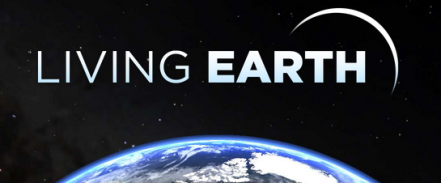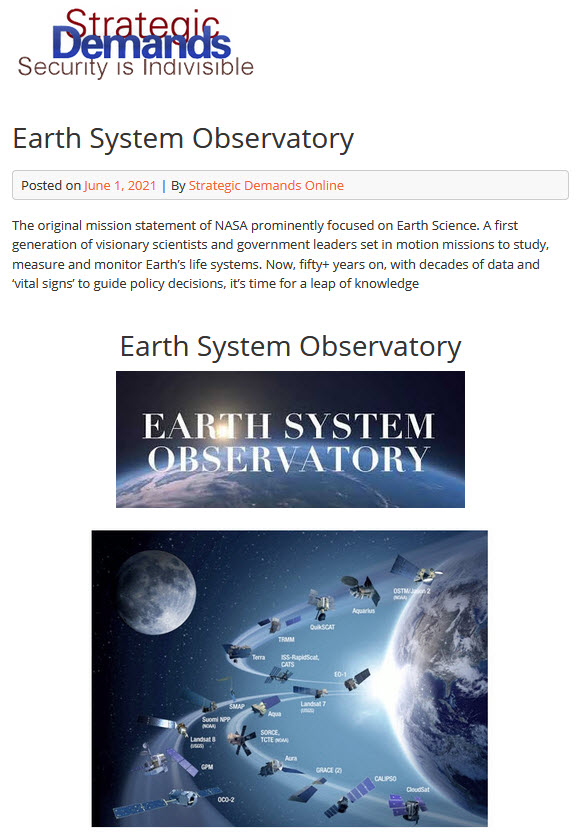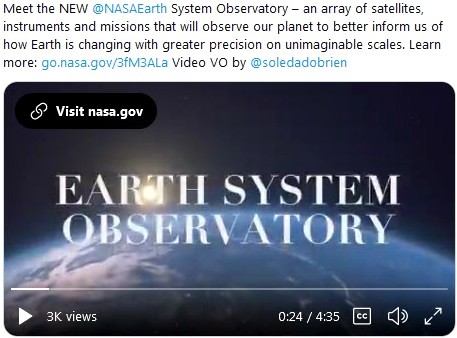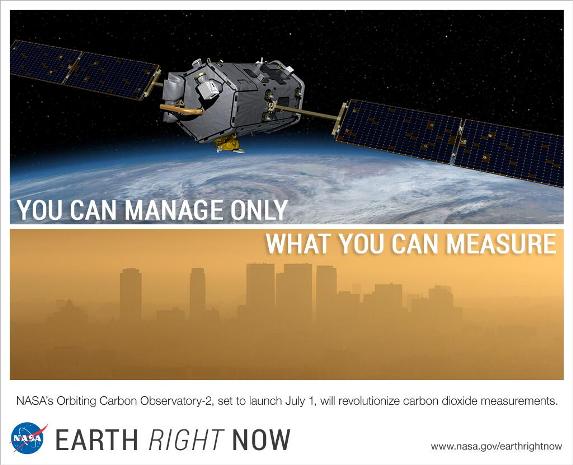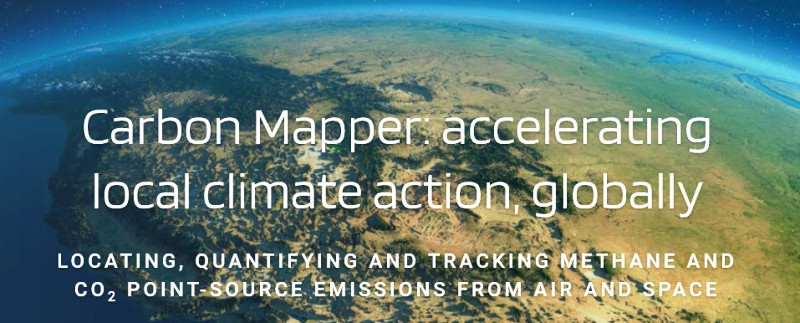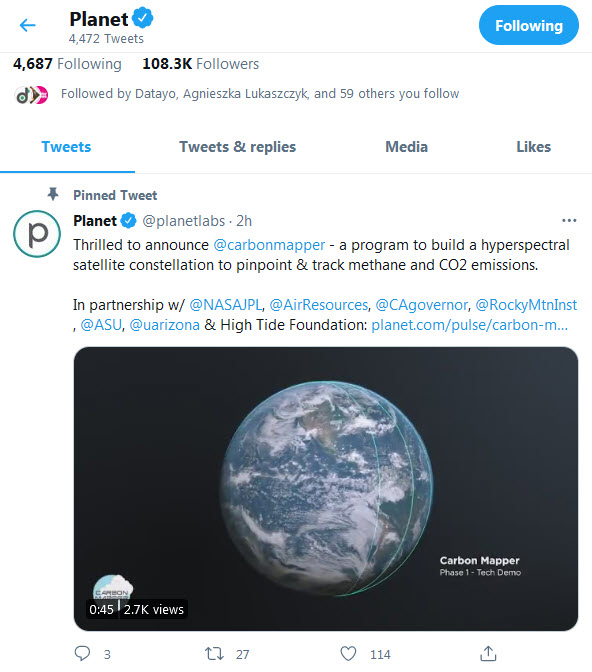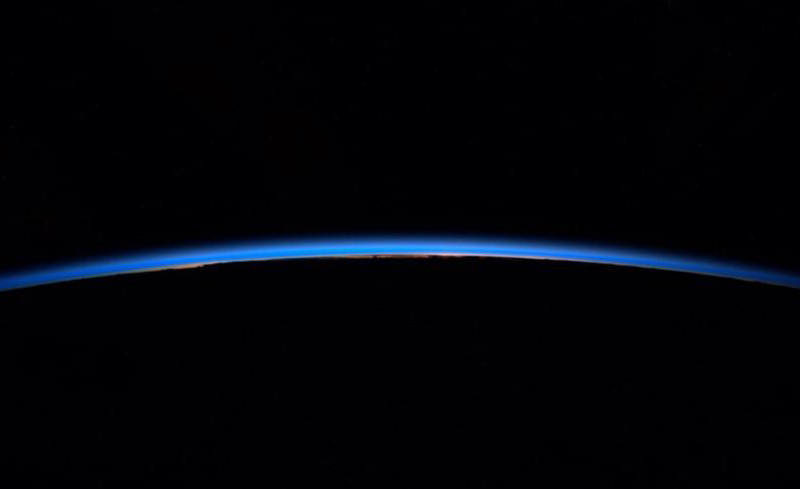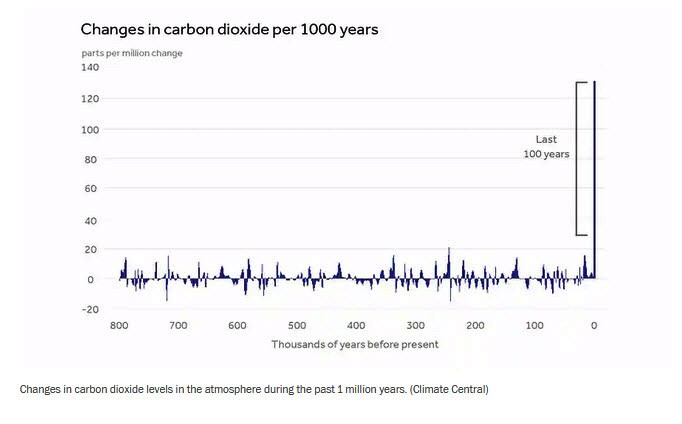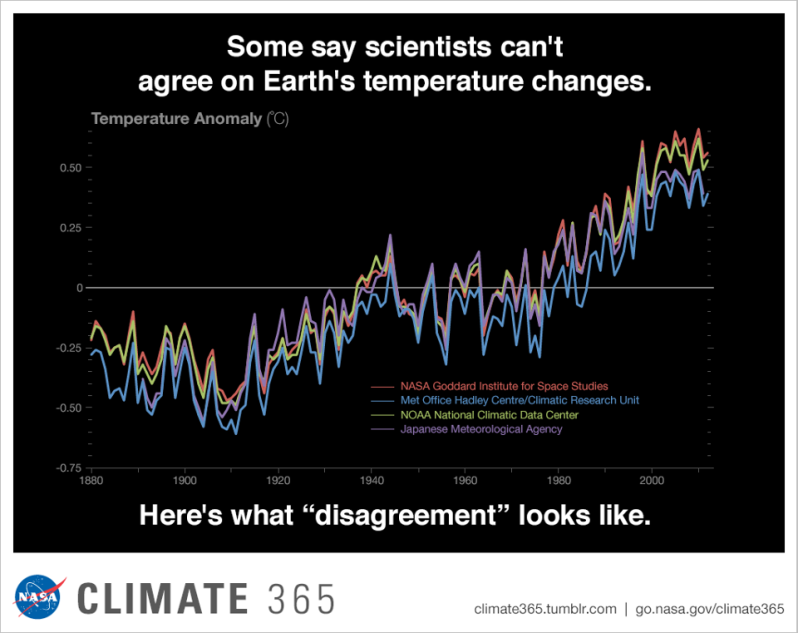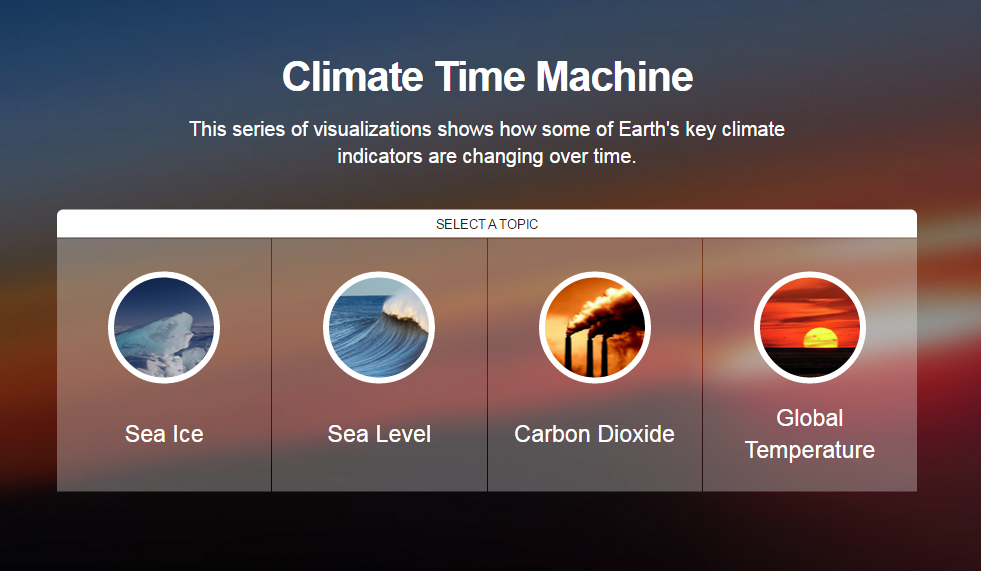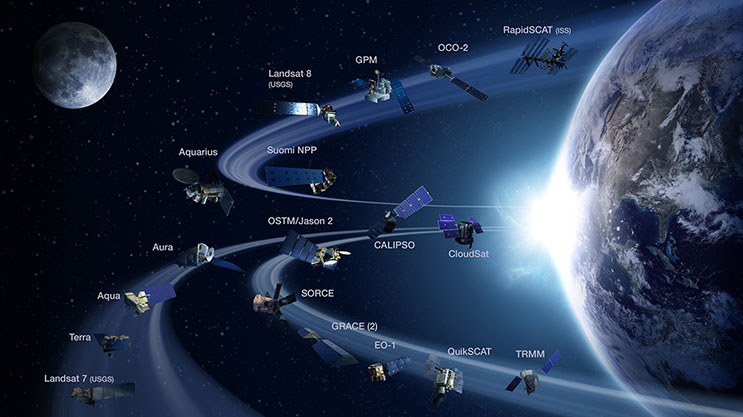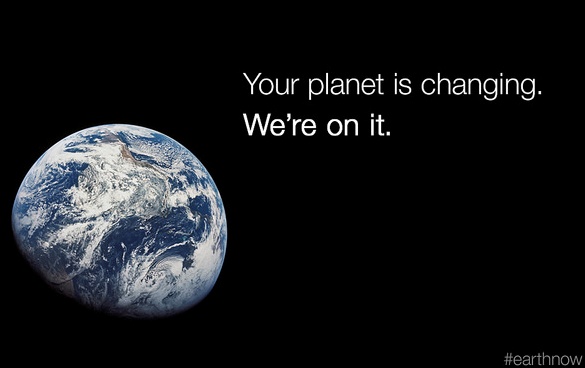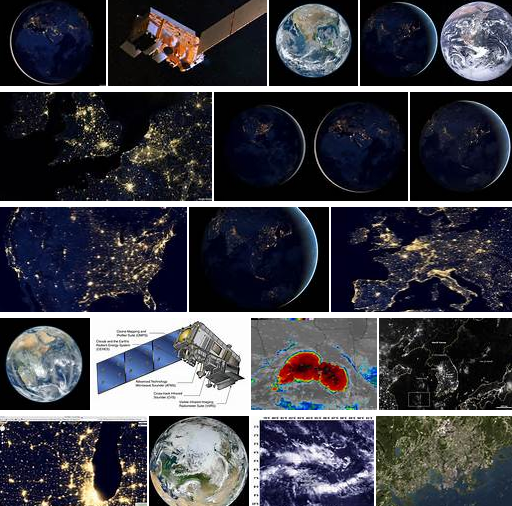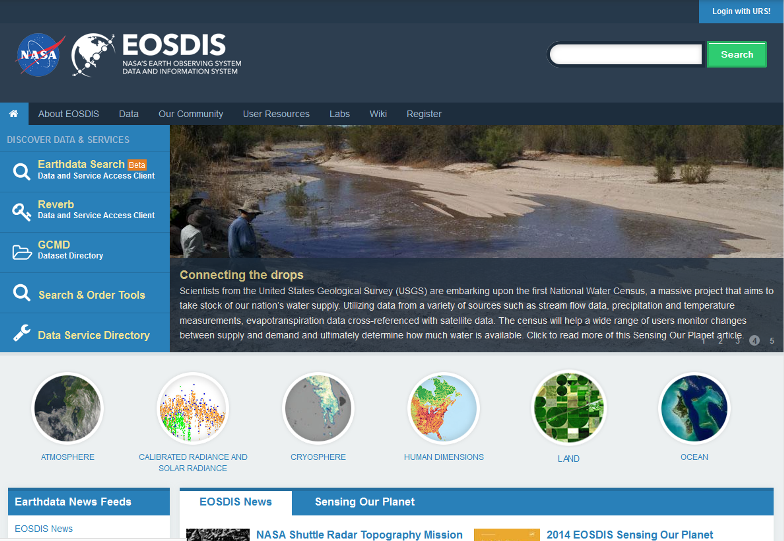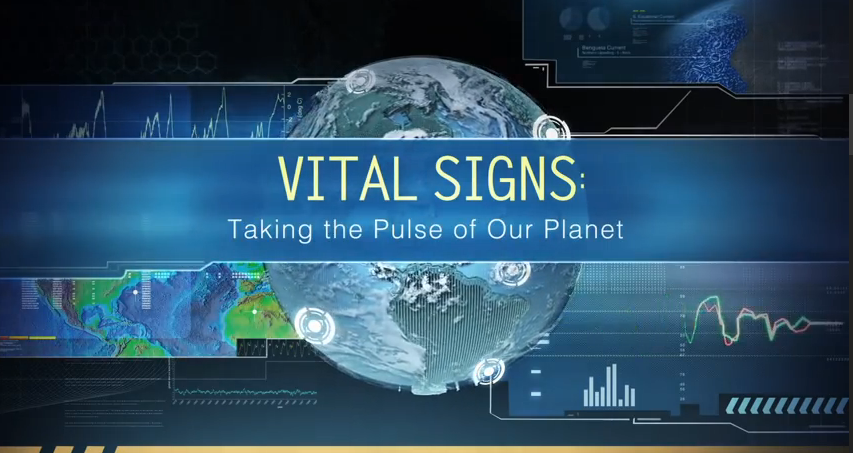Earth Right Now
2021
🌎
NASA Fiscal Year 2023 Budget Request
May 2022
GreenPolicy360: We are putting forward a proposal to restore the Earth Science provisions to the Mission Statement of NASA.
Journalist Andrew Revkin wrote about the removal of this initial provision that was an essential part of the beginning of NASA as a government agency. We believe that, although these provisions were 'silently' removed in 2006, they continue to playing an essential role in the missions of NASA and NASA's work.
Here is what Andrew Revkin wrote some 15 years ago:
>Andrew Revkin/July 22, 2006/ NY Times
>“To understand and protect our home planet; to explore the universe and search for life; to inspire the next generation of explorers ... as only NASA can.”
>In February 2006, the phrase "to understand and protect the home planet" was quietly removed from the National Aeronautics and Space Administration (NASA)'s official mission statement.
>It is the first time since NASA’s founding in 1958 that the mission statement does not explicitly include mention of the Earth.
Here is part of NASA Administrator Bill Nelson's testimony before the Senate oversight committee this past week:
INDEED A LOT OF PEOPLE THINK OF NASA AS THE SPACE AGENCY. DON'T FORGET TO THE FIRST A, AERONAUTICS. BUT ALSO, PEOPLE DON'T REALIZE IT IS ALSO THE POINT OF THE SPHERE ON CLIMATE AND CLIMATE CHANGE BECAUSE ALL THE MEASUREMENTS THAT ARE BEING MADE ARE DONE BY INSTRUMENTS THAT WE DESIGN, BUILD, LAUNCH AND MANY OF THEM WE OPERATE.
OVER THE COURSE OF THE NEXT DECADE WE ARE GOING TO HAVE A GREAT OBSERVATORY OF FIVE ADDITIONAL MAJOR SPACECRAFT THAT ALL OF THIS INFORMATION IS GOING TO BE PUT INTO A 3D COMPOSITE ON PRECISELY WHAT IS HAPPENING TO THE EARTH'S CLIMATE. WHAT'S HAPPENING TO THE WATER, TO THE LAND, TO THE ICE, TO THE ATMOSPHERE. WE ARE PUTTING UP AT THE END OF THIS YEAR A MISSION THAT IS GOING TO BE ABLE TO MEASURE FOR THE FIRST TIME THE ELEVATION OF THE STREAMS AND RIVERS AND LAKES, THE FRESHWATER. WE'VE BEEN ABLE TO MEASURE THE ELEVATION OF THE OCEANS, THE SALTWATER. WE ARE GOING TO BE ABLE TO FIND OUT VERY PRECISELY WHAT IS HAPPENING TO THE ICE.
ALL OF THIS AND WE HAVE THE SUPPORT OF THE WHITE HOUSE ON THIS AND WE HOPE WE WILL HAVE YOUR SUPPORT. WE ARE GOING TO CREATE IF YOU CAN ENVISION IN SPACE TERMS A MISSION CONTROL CENTER. IT'S GOING TO BE CALLED THE EARTH INFORMATION CENTER. IT'S GOING TO BRING ALL OF THIS DATA IN AND IT'S GOING TO BE DISPLAYED AND IT'S GOING TO BE AVAILABLE TO EVERYBODY, NOT JUST GOVERNMENT AT ALL LEVELS INCLUDING YOUR LOCAL COUNTY COMMISSION WHEN THEY ARE PLANNING, BUT IT'S GOING TO BE AVAILABLE TO SCHOOLS AND UNIVERSITIES AND THE PRIVATE SECTOR AS WELL AS TO WHAT IS HAPPENING AND THE CHANGES THAT ARE HAPPENING TO THE CLAIMANT.
Readers of GreenPolicy360 can look back at our founder's work with George E. Brown, who was instrumental as a leader in Congress for over 30 years and led Earth Science efforts, including advancing NASA's first generation of earth research from space.
Congressman Brown's point of view for over 30 yrs in Congress was that technology, science, data are guides necessary for smart policy decisions. Check out his record. George set in motion many of the programs and missions to accomplish multi generational envir protection goals that we have taken up and carried on...
The Original Mission Statement of NASA ((1958) provided Congressional intent and guidance to the first generation of space programs. George, if he were here, would've done everything within his power to protect the original mission statement, even as misinformation and denial are rampant these days ...
Advancing an Intergenerational Science Mission
Earth Right Now -- the Earth System Observatory
_____________
May 3, 2022
NASA Administrator Bill Nelson and National Science Foundation Director Sethuraman Panchanathan testified before the Senate Appropriations Subcommittee on Science at a hearing on their agency’s fiscal year 2023 budget request. Administrator Nelson answered a variety of questions, including Russia and the International Space Station, the 2025 Artemis Mission to the Moon, climate change, and infrastructure. Director Panchnathan addressed STEM (science, technology, engineering and math) education investments, technology innovation, and quantum computing. They both addressed competition with China, national security concerns, and the importance of private-public partnerships
More re: NASA Priorities at https://www.c-span.org/video/?519058-1/nasa-administrator-agencys-priorities
'Beginnings of the Modern Environmental movement'
"Good science needs good data"
Carbon Mapper
- Earth, Science & Politics:
- Planet Citizens, Planet Scientists
2020
Earth Observation System / EOS
Earth Right Now (Daily via NASA)
• (TW) https://twitter.com/NASAClimate
• (TW) https://twitter.com/NASA
• (TW) https://twitter.com/NASAJPL
Earth Research from Space @ GreenPolicy online
2019-2018
Global Climate Change Resources from NASA
2017
2017 Takes Second Place for Hottest Year
2016
Science in the Cause of National & Global Security
NASA Announcement: Unlimited access to the 16-plus-year database for the Ministry of Economy, Trade and Industry (Japan) Advanced Spaceborne Thermal Emission and Reflection Radiometer (ASTER) instrument, which flies aboard NASA's Terra satellite. ASTER’s database, more than 2.95 million individual scenes is worldwide....
"We anticipate a dramatic increase in the number of users of our data, with new and exciting results to come," said Michael Abrams, ASTER science team leader at NASA Jet Propulsion Laboratory in Pasadena, California, home to ASTER's U.S. science team.
- 2015
From Above We See Our Planet: High Definition Video from NASA
JPL-NASA #EarthScience from space / Five new #EarthNow missions
······································
The DSCOVR Mission
Images of Earth from DSCOVR-EPIC in Lagrange orbit, daily 'selfies' from a million miles away
·········································································
- DSCOVR is launched and on its way!
Feb 12, 2015 The DSCOVR satellite with its EPIC cam, PlasMag & NISTAR instrument package is on the way... a million mile journey, in approx four months, it will light up, be tested and begin delivering data to Earth, including near-real-time imaging of Earth provided online.
GreenPolicy360 is assisting NASA DSCOVR mission managers and we will be delivering a stream of amazing imagery of our planet as NASA/NOAA begin uploading EPICs pictures of ... Planet Earth 'selfies'!
············································································
Feb 8, 2015 DSCOVR, EPIC and PlasMag ready to launch
NOAA’s Deep Space Climate Observatory spacecraft, DSCOVR carries three advanced instruments -- an 'Earthcam' capability instrument called EPIC, which can see visible light and "wavelengths that can tell scientists about aerosols, which cool the atmosphere, and about ozone, clouds, vegetation, and ultraviolet light... EPIC will capture 'whole earth' images, the first that will be made available since Apollo's mission in 1972.
"Another sensor, PlasMag, will keep an eye on solar weather and give the Earth updates whenever a storm on the Sun threatened to fry broad swaths of the electrical grid. That's a high-risk, low-probability event that has never happened at the feared scale. Fortunately. Yet.
"The third instrument, NISTAR, will help calculate the Earth’s energy “budget,” the measurement perhaps most critical to understanding global warming: Is more heat coming in than is going out?" [Bloomberg]
- History-making Earth Science
Earth Science Research from Space / #EarthScience
OCO-2 Historic Mission to Study the Earth's Atmosphere
NASA Challenges Public to Join In
Monitoring the Home Planet
As the realization of the critical importance of studying life systems of the planet has grown, the priorities of NASA have shifted.
The incoming US Congress will have to address the evident risks and dangers to the planet, even though its leadership denies risks and dangers.
As we review the latest from the US space agency's new focus, take a look at Pulse of the Planet, Vital Signs released Sept 2014...
To fully appreciate pulse's high resolution detail, click on the gear symbol, set it to 720p resolution and choose full screen video
"Pulse of the Planet" / HD Video
bit.ly/VitalSignsPulseofthePlanet
- Earth Right Now
- Vital Signs
NASA Climate: Vital Signs of the Planet
○
Where did Earth Right Now start as a mission?
NASA's Earth Science Enterprise (ESE) -- Originally called "Mission to Planet Earth (MTPE)"
NASA's Earth Science Division' plans and manages earth science programs including Earth Right Now.
"The Earth Science Enterprise (ESE)is dedicated to "understanding the total Earth system and the effects of natural and human-induced changes on the global environment."
NASA’s Earth Observing System (EOS) provides "long-term global observations of land surfaces, biosphere, solid Earth, atmosphere, and oceans."
The Earth Science Projects Division manages the missions which advance our understanding of the Earth.
NASA's Earth Observing System Project Office
- NASA Earth Science: Critical Science, Vital Signs
Current Generation Earth Research from Space, Missions and Programs
Responding to the Challenge of Climate and Environmental Change
Earth Observing System Data and Information System - Maps
Suomi NPP - Next-generation Earth-observing satellite system
Next generation NASA-NOAA #EarthMonitoring satellite
○
http://eros.usgs.gov/ceos/lsip.shtml
http://eros.usgs.gov/ceos/satellites_midres1.shtml
http://eros.usgs.gov/ceos/satellites_midres2.shtml
http://eros.usgs.gov/ceos/satellites_midres3.shtml
http://eros.usgs.gov/ceos/overview.shtml
http://eros.usgs.gov/ceos/sensors_midres8.shtml
"The ultimate beneficiaries are the present and future generations of the people on Earth..."
"The goal of the Earth Observing project is improved understanding of the Earth as an integrated system."
"Earth Science: "To improve life here" and "to understand and protect our home planet."
Eyes on the Earth - Earth Right Now
○
Visible Earth_2, Visible Earth_3
○ ○ ○ ○
- Planet Citizens, Y/Our Planet Is Changing
We need to develop Earth Science as a comprehensive factual set of measurements if we are to secure and manage the future of the Earth Systems
In the 1980s, the U.S. House Science, Space and Technology Committee led a new Earth vision and NASA embraced the concept of Earth system science with a global perspective of Earth monitoring
The continuing mission of NASA, its partners and Earth Science research remains vital to [1] new understandings of national and global security
We are in a race against time
We need the best possible scientific knowledge to protect and preserve "The Commons"
as 'wise stewards' securing communities, nations and global eco-systems
○ ○ ○ ○
"We shall never cease from exploration
and the end of all our exploring will be to arrive where we started and know the place for the first time."
– T.S. Eliot
Terra - Thermal Emission Reflection Radiometer ...
#EarthScience #PlanetCitizens #PlanetCitizens, PlanetScientists #EarthPOV
- Antarctica
- Anthropocene
- Arctic
- Atmospheric Science
- Climate Change
- Climate Policy
- Digital Citizen
- Earth Imaging
- Earth Observations
- Earth Science
- Earth Science from Space
- Earth System Science
- Eco-nomics
- Environmental Security
- Environmental Security, National Security
- EOS eco Operating System
- ESA
- Global Security
- Global Warming
- ISS
- NASA
- NOAA
- Natural Capital
- New Definitions of National Security
- New Space
- Oceans
- Ocean Ecosystem
- Ocean Science
- Ocean Sustainability
- Planet Citizen
- Planet Citizens
- Planet Citizens, Planet Scientists
- Planet Scientist
- Planet API
- Strategic Demands
- Biogeosciences
- Cryosphere
- Geophysics and Geochemistry
- Mineralogy
- Geology
- Geophysics
- Hydrology
- Natural Resources
- Planetary Science
- Space Science and Space Physics
